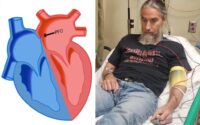Allergies, pollen could send you to ER this year, Health Dept. warns
You’ve got to be pollen our legs.
Allergy season is in full swing — and it could send some New Yorkers to the emergency room, according to a new bulletin from the New York City Department of Health and Mental Hygiene geared toward medical professionals.
The notice warned that this upcoming pollen season will worsen symptoms in anyone allergic to tree pollen, causing asthma attacks and allergic rhinoconjunctivitis. The latter involves those pesky symptoms we all know and love — a runny nose, itchy eyes and congestion.
“Over-the-counter allergy medication sales and asthma emergency department (ED) visits (particularly in
children) typically increase in April and May, coinciding with peak tree pollen concentrations,” the health agency cautioned.
From the department’s data, on average about 260 New Yorkers make the trip to the ER for their allergies every May. According to Gothamist, that’s the month when pollen is at its peak.
The May figure compares to the 218 ER visits made on average in April due to allergies.


The department also noted that hospitalizations for allergies were lower in 2020 during the COVID-19 pandemic.
“If you’re prone towards allergies, you develop an antibody called IGE to that particular allergen,” Dr. Arveen Bhasin, a Mayo Clinic allergy and immunology expert, said in a “Mayo Clinic Minute” earlier this month.
“When you’re exposed to that allergen, it causes the release of histamine and these other mediators,” says Dr. Bhasin.

One potential reason that allergy symptoms are even worse this year in cities like NYC could be due to something called “botanical sexism,” according to NBC4 Washington.
Horticulturist and author Tom Ogren, who came up with the term, told the outlet that it’s easier to plant male trees instead of female trees in urban areas, because they’re easier to look after.
Female trees might be better for your allergies, as they don’t produce pollen — but they are messier, as their seeds can leave more remnants on the street, which is why they have been avoided.
According to the NYC bulletin, grass pollen often starts in the late spring and peaks in the summer.
Statements from the Department of Health also explained that the increase in ER visits only lasts for a short timeframe, of about two to three weeks, but emphasized that it was important to prepare in advance.
Some of the precautions they recommended for doctors was to tell patients that anti-allergy medication should be taken before symptoms even begin.
“First-line treatment is what we call oral antihistamines that help with some of the itching, running, sneezing. And the nasal spray is really helping to focus on some of the congestion and the runny nose,” Bhasin said.

They also recommended allergy sufferers use a “simple nasal saline spray” to help ease congestion, and use artificial tears to help sore or itchy eyes.
However, they did note that any product that contains a vasoconstrictor — drugs like Visine that cause narrowing of the blood vessels — should not be used for more than two or three days.
Children in public schools can get albuterol or fluticasone for free, provided by the department; however, it can only be administered with an order from a primary care physician.
Bhasin also noted that an allergist should only be sought out as a last resort after you’ve tried readily available over-the-counter medications or environmental control measures like keeping your windows closed.
And you’re not alone in your allergy struggles — according to a recent poll, nearly one-third of people would take a pay cut in order to be allergy-free.
The poll also showed that around two in five people don’t look forward to the spring season and warmer weather due to their allergies.


